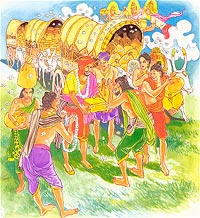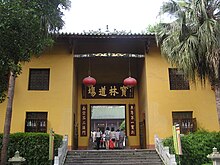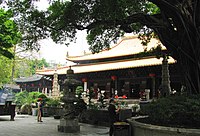through
http://sarvajan.ambedkar.org
sabbe satta bhavantu sukhi-tatta
TIPITAKA
TIPITAKA AND TWELVE DIVISIONS
Brief historical background
Sutta Pitaka
Vinaya Pitaka
Abhidhamma Pitaka
Twelve Divisions of Buddhist Canons
Nine Divisions of Buddhist Canons
Sutta Piṭaka
— The basket of discourses —Mahāsatipaṭṭhāna Sutta (DN 22) {excerpt} - all infobubbles— Attendance on awareness —Kāyānupassanā
IV. சட்டத்துக்கு அடிப்படையான அற முறைகளின் கூர்ந்த கவனிப்பு
Dhammapada Verse 303 Cittagahapati Vatthu - He Is Honoured Everywhere
ABOUT AWAKEN ONES WITH AWARENESS China
Fujian
• Guanghua Temple
• Kaiyuan Temple
• Wanfu Temple
Guangdong
• Nanhua Temple
• Temple of Bright Filial Piety (Guangxiao Si)
• Temple of the Six Banyan Trees

Verse 303. He Is Honoured Everywhere
Who’s full of faith and virtue,
of substance, high repute,
is honoured everywhere,
wherever that one goes.
Explanation: He who is full of faith and virtue,
who also possesses fame and fortune, in held in reverence wherever he
goes.
Dhammapada Verse 303
Cittagahapati Vatthu
Saddho silena sampanno
yaso bhogasamappito
yam yam padesam bhajati
tattha tattheva pujito.
Verse 303: He who is full of faith and virtue, who also possesses fame and
fortune, is held in reverence wherever he goes.
The Story of Citta, the Householder
While residing at the Jetavana monastery, the Buddha uttered Verse (303) of
this book, with reference to Citta, a householder of Macchikasanda town.
Citta, after hearing the Dhamma expounded by the Venerable Sariputta,
attained Anagami Magga and Phala. One day, Citta loaded five hundred carts with
food and other offerings for the Buddha and his disciples, and left for
Savatthi, accompanied by three thousand followers. They travelled at the rate of
one yojana a day and reached Savatthi at the end of a month. Then Citta went
ahead with five hundred of his companions to the Jetavana monastery. While he
was paying obeisance to the Buddha, masses of flowers dropped miraculously from
above like showers of rain. Citta stayed at the monastery for one whole month,
offering alms-food to the Buddha and the bhikkhus and also feeding his own party
of three thousand. All this time, the devas were replenishing his stock of food
and other offerings.
On the eve of his return journey, Citta put all the things he had brought
with him in the rooms of the monastery as offerings to the Buddha. The devas
then filled up the empty carts with various items of priceless things. The
Venerable Ananda, seeing how Citta’s riches were being replenished, asked the
Buddha, “Venerable Sir! is it only when Citta approached you that he is
blessed with all these riches? Is he similarly blessed when he goes somewhere
else?” To him the Buddha replied, “Ananda, this disciple is fully
endowed with faith and generosity; he is also virtuous and his reputation
spreads far and wide. Such a one is sure to be revered and showered with riches
wherever he goes.”
Then the Buddha spoke in verse as follows:
| Verse 303: He who is full of faith and virtue, who also possesses fame and fortune, is held in reverence wherever he goes. |
- Fujian
- http://en.wikipedia.org/wiki/Guanghua_Temple_%28Putian%29
- The Guanghua Temple (simplified Chinese: 广化寺; traditional Chinese: 廣化寺; pinyin: Guǎnghuā Sì), also known as the South Mountain Guanghua Temple (南山广寺), is a Buddhist temple located at the foot of Mount Phoenix (凤凰山), about 2 kilometres (1.2 mi) south of Putian City, Fujian Province, People’s Republic of China. Built in the penultimate year of the Southern Chen Dynasty (588 CE), it is one of the most influential Chinese Buddhism temples in China[1]
as well as one of the most scenic visitor attractions in Fujian
Province. The temple stands about 500 metres (1,600 ft) from the
entrance to the Longmen Stone Cave (龙门石洞)[2] and is spread over an area of more than 32,000 metres (105,000 ft),[3] - • Guanghua Temple
- http://en.wikipedia.org/wiki/Kaiyuan_Temple
-
Kaiyuan Temple (traditional Chinese: 開元寺, simplified Chinese: 开元寺, pinyin: Kāi Yuán Sì) could be:
- Kaiyuan Temple (Quanzhou), in Quanzhou, Fujian, China.
- mp to: navigation, search
For other uses, see Kaiyuan Temple.Kaiyuan Temple is a Buddhist temple in West Street, Quanzhou, China, the largest in Fujian province with an area of 78,000 square metres.[1] It was originally built in 685 or 686 during the Tang Dynasty but was rebuilt by the Tamil Hindu community in the city in the late 13th century who dedicated it to Lord Shiva.
Behind its main hall “Mahavira Hall”, there are some columns decorated
by some Hindu carvings. The carvings are dispersed across five primary
sites in Quanzhou and the neighboring areas. They were made in the South
Indian style, and share close similarities with 13th century temples
constructed in the Kaveri Delta region in Tamil Nadu.
Nearly all of the carvings were carved with greenish-gray granite,
which was widely available in the nearby hills and used in the region’s
local architecture.[2] In 1983, it was designated as a national temple. -
The ancient bixi turtle. (The stele it used to carry has been lost)
-
The Southern Song Quanzhou Ship, exhibited in a special pavilion on the temple’s ground
- Kaiyuan Temple (Fuzhou), in Fuzhou, Fujian, China.
- Kaiyuan Temple (Chaozhou), in Chaozhou, Guangdong, China.
- Kaiyuan Temple (Dingzhou), in Dingzhou, Hebei, China.
- Kaiyuan Temple (Xingtai), in Xingtai, Hebei, China.
- Kaiyuan Temple (Zhengding), in Zhengding, Hebei, China.
- Kaiyuan Temple (Tainan), in Tainan, Taiwan.
- Kaiyuan Temple (Zhanghua), in Zhanghua, Taiwan.
• Kaiyuan Temple
• Wanfu Temple- http://en.wikipedia.org/wiki/Wanfu_Temple
Guangdong
• Nanhua Temple
http://en.wikipedia.org/wiki/Nanhua_Temple
Nanhua Temple (南华寺) is a Buddhist monastery of the Chan School, one of Five Great Schools of Buddhism where Hui Neng, the Sixth Patriarch of the Chan School of Buddhism, once lived and taught. It is located 25 km southeast of Shaoguan, China in the town of Caoxi (漕溪), within Qujiang District. The location is in the northern part of Guangdong province, within a few kilometers from Bei River, formerly an important trade route from Central China to Guangzhou.
Contents
• Temple of Bright Filial Piety (Guangxiao Si)
http://en.wikipedia.org/wiki/Temple_of_Bright_Filial_Piety
| This article does not cite any references or sources. (December 2009) |
Guangxiao Temple (Chinese: 光孝寺; pinyin: guāngxiàosì) on Guangxiao Road is one of the oldest Buddhist temples in Guangzhou, Guangdong province, China. It was the mansion of Prince Zhao Jiande of the Nanyue Kingdom during the Western Han Dynasty (206 B.C.-A.D.24).
• Temple of the Six Banyan Trees
http://en.wikipedia.org/wiki/Temple_of_the_Six_Banyan_Trees
| Temple of the Six Banyan Trees 六榕寺 |
|
|---|---|
 |
|
| The Temple’s pagoda | |
| Information | |
| Founded | 537 AD |
| Country | People’s Republic of China |
| Coordinates | 23.128185°N 113.260642°E |
The Temple of the Six Banyan Trees (Chinese: 六榕寺) is an ancient Buddhist temple originally built in 537 in the Liang Dynasty in Guangzhou, southern China.
The temple’s proximity to foreign consulates in Guangzhou has made it a regular destination for families participating in the international adoption
of children from China. Typically families receive blessings for their
newly adopted children at this temple in front of the statue of Kuan Yin.
PRINCE WICKED AND THE GRATEFUL ANIMALS
[76]
| O |
NCE upon a time a king had a son named Prince Wicked.
He was fierce and cruel, and he spoke to nobody without abuse,
or blows. Like grit in the eye, was Prince Wicked to every one,
both in the palace and out of it.
His people said to one another,
“If he acts this way while he is a prince,
how will he act when he is king?”
One day when the prince was swimming in the river,
suddenly a great storm came on, and it grew very dark.
In the darkness the servants who were with the prince
swam from him, saying to themselves,
“Let us leave him alone in the river, and he may drown.”
When they reached the shore,
some of the servants who had not gone into the river said,
“Where is Prince Wicked?”
“Isn’t he here?” they asked.
“Perhaps he came out of the river in the darkness and went home.”
Then the servants all went back to the palace.
[77] The king asked where his son was,
and again the servants said:
“Isn’t he here, O King?
A great storm came on soon after we went into the water.
It grew very dark. When we came out of the water
the prince was not with us.”
At once the king had the gates thrown open.
He and all his men searched up and down the banks of the river
for the missing prince. But no trace of him could be found.
In the darkness the prince had been swept down the river.
He was crying for fear he would drown when he came across a log.
He climbed upon the log, and floated farther down the river.
When the great storm arose,
the water rushed into the homes of a Rat and a Snake
who lived on the river bank. The Rat and the Snake
swam out into the river and found the same log
the prince had found. The Snake climbed upon one end of the log,
and the Rat climbed upon the other.
On the river’s bank a cottonwood-tree grew,
and a young Parrot lived in its branches.
The storm pulled up this tree, and it fell into the river.
The heavy rain beat down the Parrot when it tried to fly,
and it could not go far. Looking down it saw the log
and flew down to rest. Now there were four on the log
floating down stream together.
Just around the bend in the river a certain poor man
had built himself a hut. As he walked to and fro late
at night
[78] listening to the storm, he heard the loud cries
of the prince. The poor man said to himself:
“I must get that man out of the water. I must save his life.”
So he shouted: “I will save you! I will save you!”
as he swam out in the river.
![[Illustration]](http://www.mainlesson.com/books/babbitt/morejataka/zpage078.gif)
Soon he reached the log, and pushing it by one end,
he soon pushed it into the bank. The prince jumped up and down,
he was so glad to be safe and sound on dry land.
Then the poor man saw the Snake, the Rat, and the Parrot,
and carried them to his hut. He built a fire,
putting the animals near it so they could get dry.
He took care of them first, because they were the weaker,
and afterwards he looked after the comfort of the prince.
[79]
![[Illustration]](http://www.mainlesson.com/books/babbitt/morejataka/zpage079.gif)
Then the poor man brought food and set it before them,
looking after the animals first and the prince afterwards.
This made the young prince angry, and he said to himself:
“This poor man does not treat me like a prince.
He takes care of the animals before taking care of me.”
Then the prince began to hate the poor man.
A few days later, when the prince, and the Snake, the Rat,
and the Parrot were rested, and the storm was all over,
the Snake said good-by to the poor man with these words:
[80] “Father, you have been very kind to me,
I know where there is some buried gold.
If ever you want gold, you have only to come to my home and call,
‘Snake!’ and I will show you the buried gold.
It shall all be yours.”
Next the Rat said good-by to the poor man.
“If ever you want money,” said the Rat, “come to my home,
and call out, ‘Rat!’ and I will show you where a great deal
of money is buried near my home. It shall all be yours.”
Then the Parrot came, saying: “Father, silver and gold have I none,
but if you ever want choice rice, come to where I live and call,
‘Parrot!’ and I will call all my family and friends together,
and we will gather the choicest rice in the fields for you.”
Last came the prince. In his heart he hated the poor man
who had saved his life. But he pretended to be as thankful
as the animals had been, saying, “Come to me when I am king,
and I will give you great riches.” So saying, he went away.
Not long after this the prince’s father died,
and Prince Wicked was made king. He was then very rich.
By and by the poor man said to himself:
“Each of the four whose lives I saved made a promise to me.
I will see if they will keep their promises.”
[81] First of all he went to the Snake, and standing,
near his hole, the poor man called out, “Snake!”
At once the Snake darted forth, and with every mark of respect he said:
“Father, in this place there is much gold. Dig it up and take it all.”
“Very well,” said the poor man. “When I need it, I will not forget.”
After visiting for a while, the poor man said good-by to the Snake,
and went to where the Rat lived, calling out, “Rat!”
The Rat came at once, and did as the Snake had done,
showing the poor man where the money was buried.
“When I need it, I will come for it,” said the poor man.
Going next to the Parrot, he called out, “Parrot!”
and the bird flew down from the tree-top as soon as he heard the call.
“O Father,” said the Parrot, “shall I call together
all my family and friends to gather choice rice for you?”
The poor man, seeing that the Parrot was willing
and ready to keep his promise, said: “I do not need rice now.
If ever I do, I will not forget your offer.”
Last of all, the poor man went into the city where the king lived.
The king, seated on his great white elephant,
[82] was riding through the city. The king saw the poor man,
and said to himself: “That poor man has come to ask me
for the great riches I promised to give him.
I must have his head cut off before he can tell the people
how he saved my life when I was the prince.”
So the king called his servants to him and said:
“You see that poor man over there? Seize him and bind him,
beat him at every corner of the street as you march him out of the city,
and then chop off his head.”
The servants had to obey their king.
So they seized and bound the poor man.
They beat him at every corner of the street.
The poor man did not cry out, but he said, over and over again,
“It is better to save poor, weak animals than to save a prince.”
At last some wise men among the crowds along the street
asked the poor man what prince he had saved.
Then the poor man told the whole story, ending with the words,
“By saving your king, I brought all this pain upon myself.”
The wise men and all the rest of the crowd cried out:
“This poor man saved the life of our king,
and now the king has ordered him to be killed.
How can we be sure that he will not have any, or all,
of us killed? Let us kill him.”
And in their anger they rushed from every side upon
[83] the king
as he rode on his elephant, and with arrows and stones they killed him
then and there.
Then they made the poor man king, and set him to rule over them.
The poor man ruled his people well.
One day he decided once more to try the Snake,
the Rat, and the Parrot. So, followed by many servants,
the king went to where the Snake lived.
At the call of “Snake!” out came the Snake from his hole saying,
“Here, O King, is your treasure; take it.”
“I will,” said the king. “And I want you to come with me.”
Then the king had his servants dig up the gold.
Going to where the Rat lived, the king called, “Rat!”
Out came the Rat, and bowing low to the king, the Rat said,
“Take all the money buried here and have your servants carry it away.”
“I will,” said the king, and he asked the Rat to go with him
and the Snake.
![[Illustration]](http://www.mainlesson.com/books/babbitt/morejataka/zpage084.gif)
Then the king went to where the Parrot lived, and called,
“Parrot!” The Parrot flew down to the king’s feet and said,
“O King, shall I and my family and my friends gather choice rice for you?”
[84] “Not now, not until rice is needed,” said the king.
“Will you come with us?” The Parrot was glad to join them.
So with the gold, and the money, and with the Snake, the Rat,
and the Parrot as well, the king went back to the city.
The king had the gold and the money hidden away in the palace.
He had a tube of gold made for the Snake to live
[85] in.
He had a glass box made for the Rat’s home,
and a cage of gold for the Parrot.
Each had the food he liked best of all to eat every day,
and so these four lived happily all their lives.










